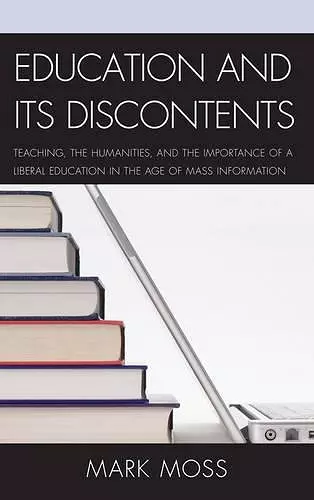Education and Its Discontents
Teaching, the Humanities, and the Importance of a Liberal Education in the Age of Mass Information
Format:Hardback
Publisher:Lexington Books
Published:21st Dec '11
Currently unavailable, and unfortunately no date known when it will be back
This hardback is available in another edition too:
- Paperback£44.00(9780739184189)

Among the many studies that have investigated the crisis of the humanities and liberal education in the past two decades, none is more comprehensive, well-researched, incisive, or elegantly presented than Mark H. Moss's Education and its Discontents. One by one, Moss takes up the causes of the demise; from the enormous social and governmental demands placed upon universities and the "corporate" response to deal with them, to the massive proliferation of distracting electronic devices, to "feel good" teaching and learning that lacks rigor and accountability, Moss examines each factor, his argument gathering overwhelming momentum. Without knowledge of the principal books in the canon, argues Moss, students lack the intellectual experience that enables them to make independent judgments of merit, taste, and morality. -John Paul Russo, author of The Future without a Past: The Humanities in a Technological Society (2005)
Education and Its Discontents: Teaching, the Humanities, and the Importance of a Liberal Education in the Age of Mass Information, by Mark Moss, is an exploration of how the traditional educational environment, particularly in the post-secondary world, is changing as a consequence of the influx of new technology. Students come to the classroom or lecture hall expecting to have their habits and tastes, gleaned from the online world, replicated in an Educational environment. Faculty who do not adapt face enormous obstacles, and faculty that do adapt run the risk of eroding the integrity of what they have been trained to teach. Students now have access to myriad of technologies that instead of supplementing the educational process, have actually taken it over. Issues that run from plagiarism to the erosion of the humanities are now rampant concerns in the post secondary world. Behavior issues, YouTube videos, cell phones, and the incessant clicking of the computer keys are just a few of the technologies altering the educational landscape. Moss discusses that it is now not only how we learn, but what we continue to teach, and how that enormously important legacy is protected. Education and Its Discontents: Teaching, the Humanities, and the Importance of a Liberal Education in the Age of Mass Information, by Mark Moss, argues that education has changed and the supremacy of the book and the lecture is now open for debate. What has been gained over the last five hundred years is now susceptible to the vagaries of technology, which compel us to question their continuing relevance.
Today, people are born into two universes—the real and the virtual. As the 1999 movie The Matrix brought out, people today are born twice, biologically and technologically. The implications of this paradigm shift are enormous, touching upon every aspect of human cognitive, social, and emotional life. Education in particular is changing almost daily because of this shift in human civilization. Moss’s book looks at the implications in a remarkably clear yet highly insightful way. His understanding of the shift is deep and reflective. This is required reading for social scientists, educators, and anyone worried or apprehensive of how education, nay, civilization, is evolving. -- Marcel Danesi, University of Toronto
Among the many studies that have investigated the crisis of the humanities and liberal education in the past two decades, none is more comprehensive, well-researched, incisive, or elegantly presented than Mark H. Moss’s Education and its Discontents. One by one, Moss takes up the causes of the demise; from the enormous social and governmental demands placed upon universities and the “corporate” response to deal with them, to the massive proliferation of distracting electronic devices, to “feel good” teaching and learning that lacks rigor and accountability, Moss examines each factor, his argument gathering overwhelming momentum. Without knowledge of the principal books in the canon, argues Moss, students lack the intellectual experience that enables them to make independent judgments of merit, taste, and morality. -- John Paul Russo, University of Miami
ISBN: 9780739169889
Dimensions: 241mm x 163mm x 19mm
Weight: 472g
212 pages